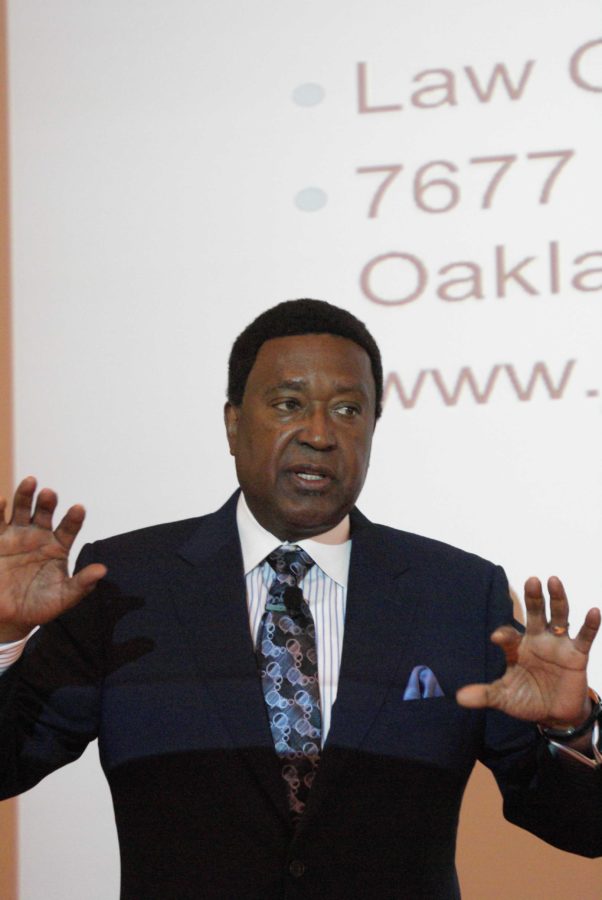John L. Burris has been waging a war against police brutality for almost 30 years.
As one of the most recognized civil rights attorneys in the nation, he shows up to work armed with the Constitution and the Bill of Rights to combat the mace, bullets and batons that police use on unwilling victims every day.
He spoke at Santa Rosa Junior College Jan, 22, to a crowded Bertolini Student Center audience on the legacy of Martin Luther King and how Dr. King paved the way for the civil rights work Burris does today.
Burris has served as attorney in hundreds of lawsuits involving police brutality, misconduct and employer discrimination against minorities. He represented such clients as Rodney King and is noted for winning the civil suit against BART Police, representing the family of Oscar Grant.
He also recently participated in on-campus protests for fallen teenager Andy Lopez.
Burris wasn’t always a lawyer. He began his education at Solano Community College and launched his first career as an accountant. Finding himself tired and miserable as a CPA, Burris felt it was time for a change and decided to study law at UC Berkeley.
In his younger years, Burris would sit captivated in front of the television, as the Civil Rights Movement unfolded across America.
Burris was inspired by King’s message of racial equality, but what impacted him the most was the horrific images of the police attacking peaceful demonstrators with tear gas during the marches to Birmingham and Selma.
The sight of the police injustice shook Burris and instilled in him a passion he uses today to protect the civil rights of police brutality victims.
In a majority of the police brutality cases that Burris has handled, racial profiling was often a catalyst for the officer’s misconduct. Burris said racial profiling is an issue that is very significant in the African American Community.
Profiling occurs when race is used as a substitute for reasonable cause, reasonable suspicion or probable cause. Under the Constitution, the police should not stop a person unless they have reasonable cause to believe that he or she has committed a crime.
“One of the ways that this is contemporarily defined is: walking while black, driving while black, being black in the wrong place and at wrong time or just standing wrong. And what this means is that people are just stopped,” Burris said. “Racial profiling itself buys into the stereotypes that exist. Race, skincolor, neighborhood, time of day.”
David Branches, an international student from South Africa studying business at SRJC, agreed with Burris and reacted with surprise to being profiled by police in the few months he has been in Santa Rosa.
“I thought that upon moving to America that racism would be pretty minimal. I drive a very nice car and the police will look at me wrong, like what the heck? I’m not doing anything wrong, I’m not a criminal. They look at me like I stole it or something,” Branches said.
Burris suggested this type of stereotyping and suspicion was what led to the killing of Trayvon Martin. While George Zimmerman was not a police officer, he acted like one when he stopped Martin while he was walking home alone, Burris said.
Nothing Martin did would have suggested any illegal activity unless there was a frame of reference or mindset that he was doing something illegal.
Although people watching the Zimmerman trial thought that the case was about race, it was not recognized as a factor in the trial. Burris said he attributes this to a strong racial bias that runs deep within the judicial system.
He hopes recent judicial reforms such as the reduction of harsh penalties for drug offenses, as well the legalization of marijuana in Washington and Colorado will hopefully lead to fewer convictions for African Americans and other minorities.
Burris advised students to follow their own dreams. “When I started out, I wasn’t very passionate about my career so I finally switched to one that I am passionate for. And that’s made all the difference in the world,” he said.
Burris encouraged students to extend the breadth of their lives, to help those who are less fortunate. Using Dr. King’s own words, Burris said, “The ultimate measure of a man is not where he stands in moments of comfort and convenience, but where he stands in times of challenge and controversy.”


